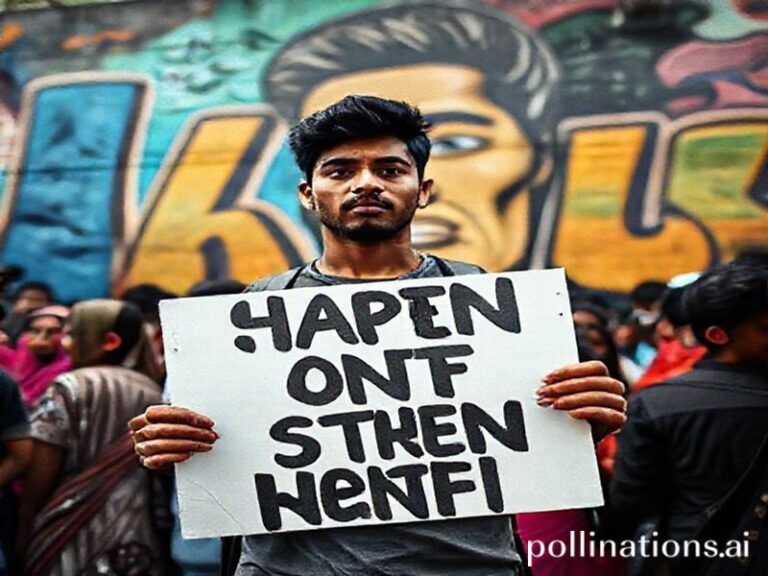Matteo Arnaldi: Sanremo’s Accidental Geopolitical Weapon Serves Up Apocalypse Distraction
Matteo Arnaldi: The Quiet Kid from Sanremo Who’s Already Booking First-Class Seats on the Apocalypse Express
By the time you finish skimming this paragraph, Matteo Arnaldi will have won another tiebreak, pocketed another ranking-spike courtesy of some top-ten headcase who double-faulted on set point, and politely reminded the ATP that the Italian Renaissance isn’t just a chapter in your dusty high-school textbook. At 6’2″ and roughly the width of a well-read passport, Arnaldi has become the global south of European tennis: overlooked on the map until the minerals start flowing, at which point everybody suddenly remembers where Liguria is.
International significance? Let’s begin with the obvious: we live in an era where geopolitical power is measured less in aircraft carriers and more in Netflix subtitled dramas and breakout athletes. Italy, still clinging to its G7 membership like a hipster to vinyl, has discovered that soft power can be served with a slice of 134-mph kick serve down the T. Arnaldi is the latest export, packaged alongside espresso pods and diplomatic apologies for colonialism. His rise from Challenger-level anonymity to US Open fourth-round curiosity has provided the European Union with something it desperately needed: a distraction from the fact that half its rivers are currently experiencing an unscheduled drought sale.
Across the Atlantic, American commentators—who until last week thought Sanremo was a new espresso martini flavor—have begun pronouncing his surname with the misplaced confidence of tourists ordering “grazie” in a Roman pizzeria. Their sudden enthusiasm is less about tennis aesthetics and more about the hope that if Italy can mass-produce yet another top-50 player, perhaps the United States can still manufacture something that isn’t conspiracy theories. Meanwhile, in China, state broadcasters have clipped his matches into bite-sized reels, subtitled with motivational slogans: “Grind quietly, then detonate loudly.” Nothing says soft-power infiltration like a Gen-Z Italian kid fist-pumping in Flushing Meadows while Beijing’s algorithms count every micro-expression.
The broader implications, however, are deliciously bleak. Arnaldi’s ascent is occurring on the same planet where Wimbledon sells strawberries at hedge-fund prices while the U.K. government advises citizens to practice “heatwave yoga” in front of open refrigerator doors. Each extra ranking point he collects is a tiny reminder that athletic excellence—like fresh water and semiconductor chips—is now a luxury commodity traded by nations that can still afford indoor courts. When Matteo wins, the stock price of pasta futures probably wobbles; when he loses, a small town in Piedmont cancels plans for a new clubhouse roof. Capitalism, ever the opportunist, has already slapped his face on a cryptocurrency nobody understands but everybody in Dubai is suddenly trading at 3 a.m.
And yet, the kid himself remains stubbornly normal. He still travels coach when the airline forgets his upgrade, still thanks the physio with the enthusiasm of someone who remembers what a non-subsidized medical bill looks like. In press conferences he answers in the international language of athletes everywhere—clichés wrapped in humility, delivered with the faint panic of someone who knows the microphone can pivot from “favorite gelato flavor” to “thoughts on global inflation” in the time it takes to mispronounce “quantitative easing.” The world wants him to be a metaphor; he just wants to remember whether he packed enough overgrips.
Which brings us, inevitably, to the cosmic punchline: Matteo Arnaldi’s greatest achievement might simply be proving that in a timeline riddled with algorithmic outrage, climate anxiety, and the slow realization that democracy now runs on a four-year firmware update, there is still room for an unassuming 22-year-old to hit a yellow ball so accurately that millions pause doom-scrolling for three sets and remember what uncomplicated joy looked like—before the next push notification drags us back to the end of days.
If that isn’t a global victory, it’s at least a very Italian one: style, drama, and the quiet confidence that the empire may collapse, but the espresso will still be perfect.







